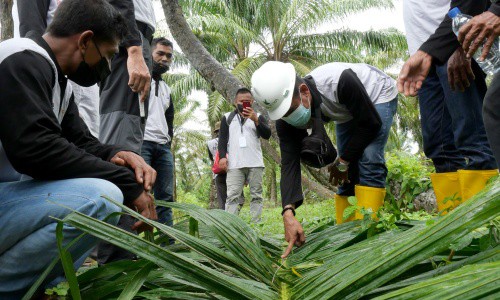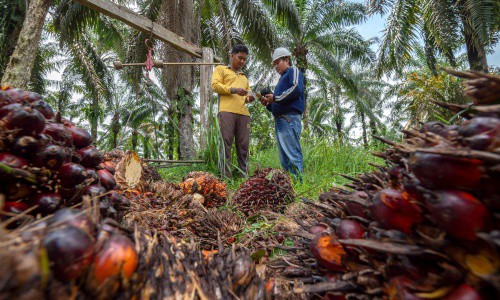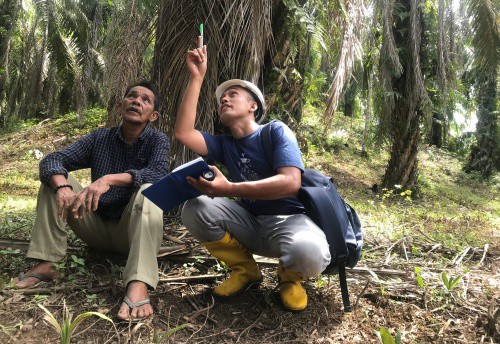Palm oil is not only used in cooking, but it is also used in food products, detergents, cosmetics and even ice cream.
The oil palm tree, which produces the high-quality oil, is grown only in the tropics, provides far greater yield at lower cost of production of production. Global demand for the product has contributed to wide deforestation in Asia, Africa and Latin America as oil palm tree plantations expands worldwide at the expense of critical habitats for endangered species.
Burning forests to make room for the crop is also a major source of greenhouse gas emissions. Intensive cultivation methods result in soil pollution and erosion and water contamination.
Around 90% of the world's oil palm trees are grown on a few islands in Malaysia and Indonesia – islands with the most biodiverse tropical forests found on Earth. In these places, there is a direct relationship between the growth of oil palm estates and deforestation.
In Indonesia, Golden Agri-Resources (GAR) has been working with multiple stakeholders in the palm oil production supply chains to promote sustainable practices that would protect the environment.
GAR is a global leader in palm oil production, producing more than 2.35 million tonnes of crude palm oil (CPO) in 2021. It manages about 536,000 hectares of plantations, including smallholder farms, across Indonesia. Its downstream refining and specialty product facilities manufacture high-quality products for the global agronomy, food, oleochemical, and bioenergy markets. We have also launched a sugar storage and distribution business to leverage our shipping and logistics capabilities.
Globally, GAR now has operations across 13 countries, and its products are delivered to around 100 countries worldwide, including China, India and the USA as well as various destinations in Europe and the Middle East.
Partnerships with stakeholders
GAR continues to seek out partnerships that would advance its goal for industry-wide sustainability practices across palm oil production.
Recently, the company announced it is collaborating with Golden Agri-Resources (GAR) with MARS and Fuji Oil to roll out Sawit Terampil, an upskilling programme for more than 4,000 independent smallholders from the Leuser Ecosystem area in Aceh and North Sumatera.
The programme aims to provide comprehensive support to independent smallholders through group coaching and individual support to implement good agricultural practices. Capacity building trainings and mentoring will teach independent smallholders to improve their cultivation methods and prepare them to register for ISPO and RSPO certifications, which in turn will help increase their incomes.
The ISPO and ROSP certifications ensure that smallholders implement sustainable farming practices. It helps improve their livelihood and conserve the environment.
"Upskilling farmers and suppliers with knowledge is key to implementing sustainable agriculture practices. Building on the information we gained through the traceability initiatives, we can analyse the potential gap in productivity, yield and agricultural practices and provide targeted assistance to smallholders," said Anita Neville, chief sustainability & communications officer at GAR,
Wahyu Wigati Wijayanti, head of traceable & transparent production at GAR, explained how the company actively engages farmers in trainings to improve sustainable farming practices.
"Sawit Terampil is currently implemented in 10 regencies in North Sumatera and Aceh and will continue until December 2023,” she said. “Since the implementation of the programme, around 61% of participants have increased their understanding of sustainable oil palm cultivation practices compared to before joining the programme."
"In the future, we want to help farmers who are ready to obtain ISPO and RSPO certifications. We continue to welcome opportunities to collaborate with potential partners to help our farmers and the agriculture sector grow," said Wahyu.
As of September 2022, Sawit Terampil has registered and mapped 3,783 farmers. The programme conducted a total of 4,554 coaching sessions, with 3,296 farmers having been trained or individually coached.

Getting the aid technology
GAR believes improving farmer livelihoods is a shared responsibility that requires contributions from all parts of the value chain.
It has developed an ecosystem of knowledge and financing partners to help deliver Sawit Terampil including Koltiva, an agri-tech company, as an implementing partner and SMART Research Institute, the company's research arm on best agronomy practices for mentorship, and MARS and Fuji Oil.
Koltiva supports the programme with its comprehensive technology ecosystem, KoltiTrace and its agronomists and field agents on the ground to help smallholder farmers to achieve sustainability standards.
"Our data-driven coaching methodology combines technology with on-ground agronomists to enhance the effectiveness of traditional capacity-building programs. By receiving tailor-made advice on good agriculture practices that are driven by data, we hope to improve smallholders' livelihood while helping to preserve the environment," Ainu Rofiq, chief operating officer at Koltiva.
Rukaiyah Rafik from Indonesia Sustainable Oil Palm Smallholders Forum highlighted the lack of knowledge and education are often stumbling blocks for farmers. She shared that farmers experience poor yield because of the variety and quality of the fruit they grow. High level of illiteracy among farmers makes it difficult for farmers to properly record their production and other farm activities. However, these challenges could be tackled with targeted assistance and transfer of knowledge with programme, such as Sawit Terampil.
GAR and its partners believe that Sawit Terampil is another important step in involving suppliers in the transformation process and the company will continue to share its experiences and best practices with suppliers to foster a responsible and robust industry.

100% transparency to plantation plan
Sawit Terampil builds on GAR's traceability efforts which has seen the company map 95% of its supply chain to the plantation. GAR is now looking to further improve the livelihoods of farmers identified through traceability to plantation efforts with the programme.
In 2016, GAR first launched a traceability to plantation (TTP) plan to map out the company’s palm oil supply chain ecosystem. This means engaging with millions of smallholders and third-party suppliers, as well as understanding the complexity of the process. By the next year, the company achieved full plantation traceability.
In 2019, the company started working with Koltiva to ensure palm oil smallholders adopt sustainability practices. GAR’s TTP initiative allows the company to build a solid relationship with smallholders and devise proper intervention methods to help them increase productivity, reduce their environmental footprints, and implement best practices.
As part of the TTP initiative, the two organisations launched the Ksatria Sawit programme to support and accelerate data collection of independent third party suppliers’ mills.
The TTP program helps smallholders employ comprehensive supply chain data from upstream to downstream — from growers and processing mills to GAR. The company provides them with apps to track fruit delivery and manage crop quality. With this data, smallholders can better predict and avoid any environmental risks impacting their plantations, such as climate change, deforestation, and water security.
As of September 2022, the Ksatria Sawit programme achieved the following: 101,598 palm oil smallholders registered; 1,521 palm oil SMEs mapped; 356,417 hectares of palm oil plantations mapped




